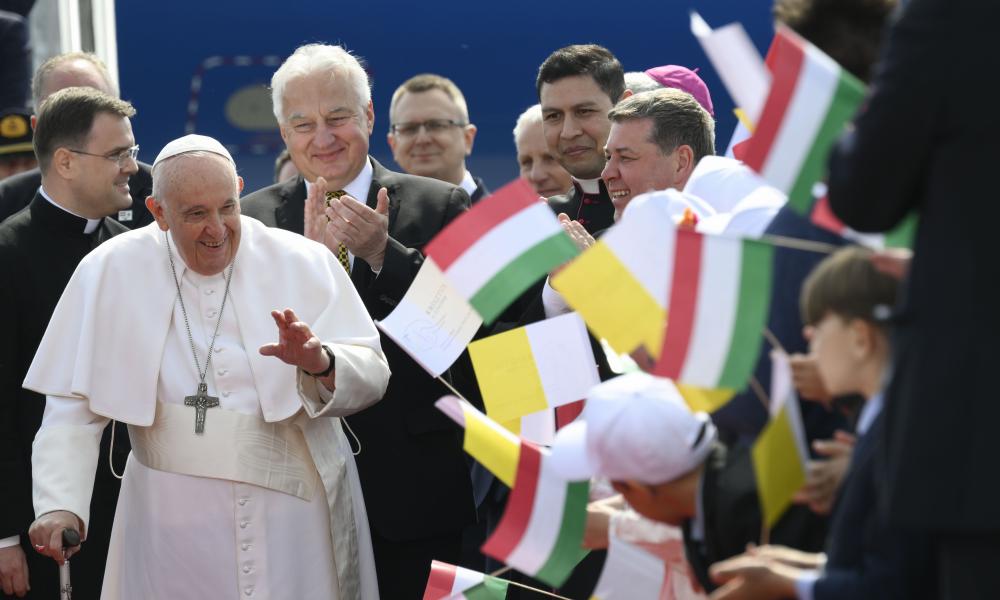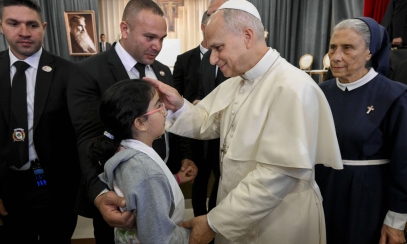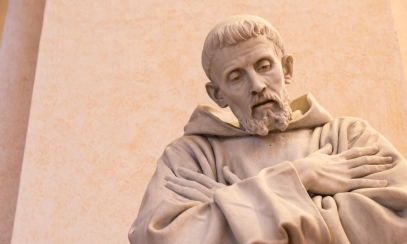
Recognize God at Work in the World, Pope Tells Hungarians
April 29, 2023 | Fear, anger and rigidity will do nothing to reverse the growth of secularism and a decline in the number of Catholics attending Mass, Pope Francis said; the only effective response is to give a living example of faith.
April 29, 2023 | Fear, anger and rigidity will do nothing to reverse the growth of secularism and a decline in the number of Catholics attending Mass, Pope Francis said; the only effective response is to give a living example of faith.
"The church to which we must aspire," he said, is "a church capable of mutual listening, dialogue and care for the most vulnerable, a church welcoming to all and courageous in bringing the prophetic message of the Gospel to everyone."
Pope Francis met with 1,100 bishops, priests, seminarians, religious and catechists in the Basilica of St. Stephen in Budapest April 28, the first day of his three-day trip to the Hungarian capital. Another 4,000 churchworkers were seated in the square in front of the basilica, watching on video screens.
Dominican Sister Krisztina Hernády, who works with six other sisters in southeastern Hungary, told Pope Francis that decades of hardship and of communism left most people in the region with no idea that there is "a God who loves us personally and cares for us."
"We are confronted with people's physical and, especially, spiritual poverty every day," she said. "My sisters and I are working to be instruments of God through which we can show those who live there the joy of the Gospel."
Father József Brenner, the 88-year-old brother of martyred Blessed János Brenner, told Pope Francis that, "blessed by two parents who lived a holy life," he and both his brothers became priests.
His most important prayer intentions, he said, are for "good Christian families and good priestly vocations."
Playing on the image of the Catholic family as a "domestic church," Father Sándor Kondás, a married Eastern Catholic priest, told Pope Francis he and his wife were intent on building a cathedral through their marriage and family life. Now, after years of marriage and with five children, including one with Down syndrome, they may not have built a cathedral, but "we at least have constructed an 'emergency chapel' where anyone can enter at any time."
And that kind of openness is one of the prescriptions Pope Francis had for the Catholic Church in Hungary, and elsewhere. The Vatican's English translation of his text used the phrase "prophetic receptivity," while his original Italian also could be translated as "prophetic welcome."
"Prophetic receptivity is about learning how to recognize the signs of God in the world around us, including places and situations that, while not explicitly Christian, challenge us and call for a response," the pope said.
Even in Hungary, "with its solid tradition of faith," he said, "we witness the spread of secularism and its effects, which often threaten the integrity and beauty of the family, expose young people to lifestyles marked by materialism and hedonism and lead to polarization regarding new issues and challenges."
A truly Christian response, he said, rejects both the temptation of "defeatism" and that of "a comfortable conformism" that basically says everything is fine when it is not.
"We may be tempted to respond with harshness, rejection and a combative attitude," he said. But the Christian way is to accept them as challenges that call for finding "new approaches, methods and means of communicating" the truth of the Gospel.
Christians grow in "prophetic receptivity," he said, by "bringing the Lord's consolation to situations of pain and poverty in our world, being close to persecuted Christians, to migrants seeking hospitality, to people of other ethnic groups and to anyone in need."
One thing that absolutely must be rejected, he said, is allowing the challenges to divide the church.
"If we grow distant from one another or divided, if we become hardened in our ways of thinking and our different groups, then we will not bear fruit," the pope said. "It is sad when we become divided, because, instead of playing as a team, we start playing the game of the enemy. The devil is the one who divides. He's an artist at that; it's his specialty."
"Our first pastoral priority is to bear witness to communion, for God is communion and he is present wherever there is fraternal charity," the pope insisted.



